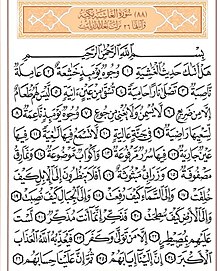Al-Ghashiyah
| الغاشية Al-Ghāshiyah The Overwhelming | |
|---|---|
| Classification | Meccan |
| Position | Juzʼ 30 |
| No. of verses | 26 |
| No. of Sajdahs | (none) |
| No. of words | 92 |
| No. of letters | 382 |
| Quran |
|---|
Al-Ghāshiyah (Arabic: الغاشية, "The Overwhelming", "The Pall") is the 88th chapter (surah) of the Qur'an, with 26 ayat or verses. The surah's topics are Paradise, Hell and the miracle of the creation of all things by God.
Summary
[edit]
This surah refers to three broad-ranging topics. First, God describes the difference between good and evil paths that an individual can take and the consequence of each path. God then clarifies their destiny and describes what hell would be like for the non-believers. The second theme mentions the creations God has made, referring to the sky, the earth, and the mountains. Lastly, in verses 21–22, God gives a direct message to Muhammad and tells him, "So remind, [O Muhammad]; you are only a reminder. You are not over them a controller."[1]
Ayat (verses)
[edit]- 1-3 The terrible day of judgment
- 4-7 Description of the torments of hell
- 8-16 The joyful state of the believers on the judgment-day
- 17-20 God manifests himself in his works
- 21-22 Muhammad only to warn, not to compel, the infidels
- 23-26 Everyone's deeds will be accounted and God will himself punish the unbelievers[2]
Hadith
[edit]- Al-Dahhak b. Qais asked al-Nu'man b. Bashir: What did the Messenger of Allah (ﷺ) recite on Friday after reciting the Surah Al-Jumua (62). He replied: He used to recite, "Had the story of overwhelming event reached you?" (Al-Ghashiyah).[3][4][5][6][7]
- Samra ibn Jundab narrated that: The Messenger of Allah (ﷺ) used to recite in the Friday prayer: "Glorify the name of your most high Lord" (Surah 87) and Has the story of the overwhelming event reached you? (Al-Ghashiyah).[8][9][10][11]
- Abu Bakr bin An-Nadr said: We were in At-Taff with Anas, and he led them in praying Zuhr. When he had finished, he said: ''I prayed Zuhr with the Messenger of Allah (ﷺ) and he recited two surahs for us in the two rak'ahs: 'Glorify the Name of your Lord, the Most High' (Quran 87) and 'Has there come to you the narration of the overwhelming?"' (Al-Ghashiyah).[12]
- It was narrated from Ibn ‘Abbas that: The Prophet (ﷺ) used to recite in the Eid prayers ''Glorify the Name of your Lord, the Most High." (Surah 87) and "Has there come to you the narration of the overwhelming?" (Al-Ghashiyah).[13][14][15][16]
- It was narrated from al-Nu'man b. Bashir that: The Messenger of Allah (ﷺ) used to recite on the two Eid prayers and on Jumu'ah: "Glorify the Name of Your Lord, the Most High" (Surah 87) and "Has there come to you the narration of The Overwhelming?" (Al-Ghashiyah) Sometimes the two (Eid and Jumu'ah) occurred on the same day, and he would recite them (these two Surahs).[17][18][19]
References
[edit]- ^ "Surah Al Ghashiyah Transliteration". Retrieved 2019-03-14.
- ^ Wherry, Elwood Morris (1896). A Complete Index to Sale's Text, Preliminary Discourse, and Notes. London: Kegan Paul, Trench, Trubner, and Co.
 This article incorporates text from this source, which is in the public domain.
This article incorporates text from this source, which is in the public domain.
- ^ Sunan Abu Dawud 1123 In-book reference : Book 2, Hadith 734 English translation : Book 2, Hadith 1118
- ^ Sunan an-Nasa'i Book 14, Hadith 60 English reference : Vol. 2, Book 14, Hadith 1424 Arabic reference : Book 14, Hadith 1434
- ^ Sunan an-Nasa'i English reference : Vol. 2, Book 14, Hadith 1425 Arabic reference : Book 14, Hadith 1435
- ^ Muwatta Imam Malik Book 5, Hadith 21 Arabic reference : Book 5, Hadith 244
- ^ Sunan Ibn MajahEnglish reference : Vol. 1, Book 5, Hadith 1119 Arabic reference : Book 5, Hadith 1173
- ^ Grade : Sahih (Al-Albani) Reference : Sunan Abu Dawood 1125 In-book reference : Book 2 Prayer (Kitab Al-Salat) (393)Chapter: What Should Be Recited During The Friday Prayer Hadith 736 English translation : Book 3, Hadith 1120
- ^ Sunan ibn Maja English reference : Vol. 1, Book 5, Hadith 1120 Arabic reference : Book 5, Hadith 1174
- ^ Sunan an-Nasa'i Vol. 2, Book 14:The Book of Jumu'ah, Hadith 1423 (Friday Prayer)
- ^ Sunan al-Tirmidhi 519 In-book reference : Book 4, Hadith 32 English translation : Vol. 1, Book 4, Hadith 519
- ^ Sunan an-Nasa'i 972 In-book reference : Book 11, Hadith 97 English translation : Vol. 2, Book 11, Hadith 973
- ^ Sunan ibn Maja reference : Vol. 1, Book 5 Establishing the Prayer and the Sunnah Regarding Them English, Hadith 1283 Arabic reference : Book 5, Hadith 1342
- ^ Sunan Abu Dawood 1122 In-book reference : Book 2, Hadith 733 English translation : Book 2, Hadith 1117
- ^ Sunan an-Nasa'i 1590 In-book reference : Book 19, Hadith 35 English translation : Vol. 2, Book 19, Hadith 1591
- ^ Sunan ibn Maja English reference : Vol. 1, Book 5, Hadith 1281 Arabic reference : Book 5, Hadith 1340
- ^ Sunan an-Nasa'i 1568 In-book reference : Book 19, Hadith 13 English translation : Vol. 2, Book 19, Hadith 1569
- ^ Sunan al-Tirmidhi 533 In-book reference : Book 5, Hadith 4 English translation : Vol. 1, Book 5, Hadith 533
- ^ Reference : Sahih Muslim 878 a In-book reference : Book 7, Hadith 78 USC-MSA web (English) reference: Book 4, Hadith 1907 (deprecated numbering scheme)

